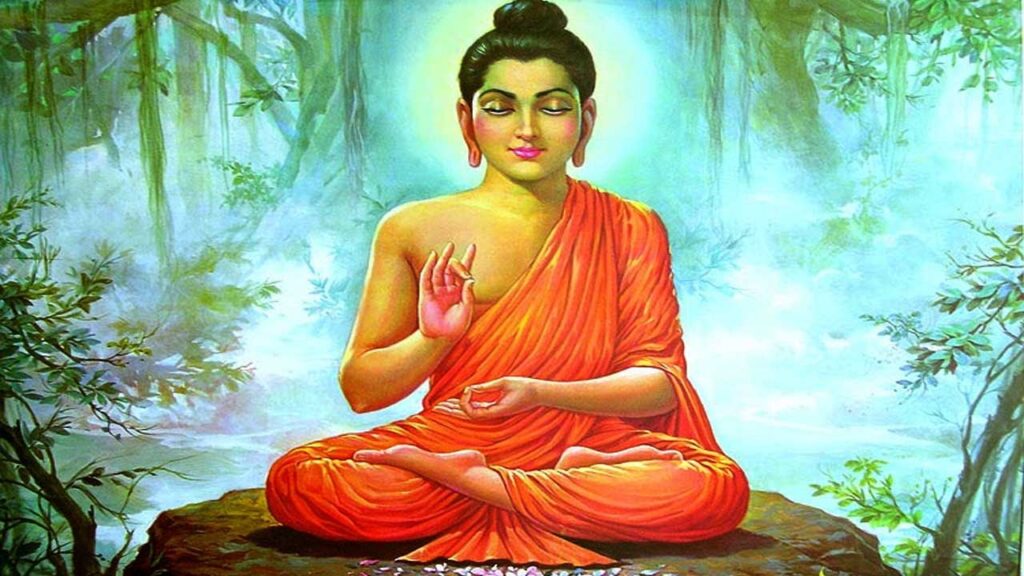
Buddha Siddhartha Gautama
- Origins:
- Born as Siddhartha Gautama around the 6th or 5th century BCE in Lumbini, Nepal.
- Born into a wealthy family, but renounced his privileged life to seek enlightenment.
- Key Teachings:
- Four Noble Truths:
- Dukkha (suffering) is inherent in existence.
- Suffering arises from craving and attachment.
- Suffering ceases when craving ceases.
- The path to the cessation of suffering is the Eightfold Path.
- Eightfold Path:
- Right View
- Right Intention
- Right Speech
- Right Action
- Right Livelihood
- Right Effort
- Right Mindfulness1
- Right Concentration2
- Modern Tenets:
- Focus on Mindfulness: Cultivating present moment awareness through practices like meditation.
- Compassion and Altruism: Developing compassion for all beings and striving to alleviate suffering.
- Ethical Living: Living a life of ethical conduct and avoiding harmful actions.
- Self-Discipline and Self-Reliance: Taking responsibility for one’s own thoughts, feelings, and actions.
- Non-Violence: Promoting peace and non-violence in all aspects of life.
- Please Note: There are various schools of Buddhism with diverse interpretations of these core tenets.
- This is a very brief overview. Buddhism is a rich and complex tradition with a long and fascinating history.
Quotes Attributed to Buddha
- “Believe nothing, no matter where you read it, or who said it, no matter if I have said it, unless it agrees with your own reason and your own common sense.” – This1 emphasizes critical thinking and encourages individuals to rely on their own understanding.
- “The mind is everything. What you think you become.” – This highlights the power of thoughts in shaping our reality and emphasizes the importance of cultivating positive and mindful thinking.
- “Hold yourself responsible for all that you are. Do not blame another. Do not blame conditions. Do not blame God. You are responsible.” – This emphasizes personal responsibility and taking ownership of one’s actions and circumstances.
- “The only real battle is within yourself.” – This suggests that the greatest challenges often lie within our own minds and that inner peace is the ultimate victory.
- “Three things cannot be long hidden: the sun, the moon, and the truth.” – This emphasizes the inevitability of truth and the importance of honesty and integrity.
- “Peace comes from within. Do not seek it without.” – This highlights the importance of inner peace and suggests that true peace cannot be found in external circumstances.
- “The mind is everything. What you think you become.” – This emphasizes the power of thoughts in shaping our reality and highlights the importance of cultivating positive and mindful thinking.
- “Holding on to anger is like grasping a hot coal; you’re the one who gets burned.” – This emphasizes the harmful effects of holding onto anger and encourages forgiveness and letting go.
- “Believe nothing, no matter where you read it, or who said it, no matter if I have said it, unless it agrees with your own reason and your own common sense.” – This2 emphasizes critical thinking and encourages individuals to rely on their own understanding.
- “The only real battle is within yourself.” – This suggests that the greatest challenges often lie within our own minds and that inner peace is the ultimate victory.
These quotes offer a glimpse into Buddha’s teachings on mindfulness, compassion, and the path to enlightenment.
Please Note: These are interpretations of Buddha’s teachings and may not be direct quotes from him.
Moreover, the WordPress community and theme developers are actively contributing to a growing library of block patterns, making it easier for users to find a pattern that suits their needs. Whether you’re building a landing page, a photo gallery, or a complex layout, there’s likely a block pattern ready to use.
This democratizes design for non-technical users while offering developers a way to extend WordPress functionality and provide more options to their clients.